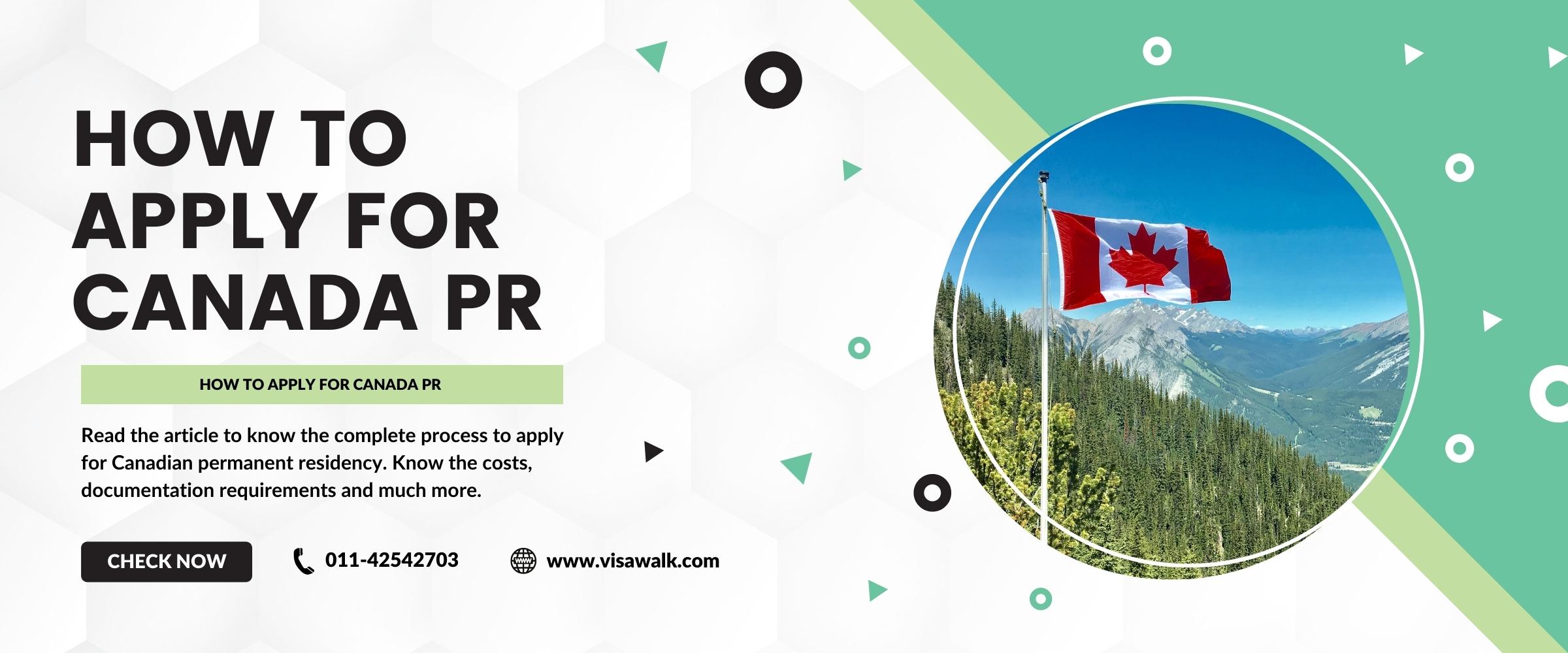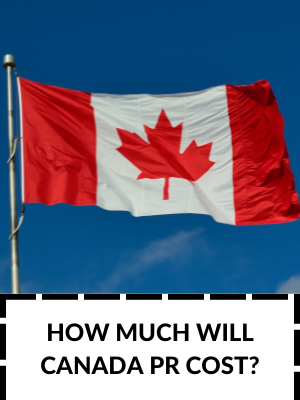HOW TO APPLY FOR CANADA PR - APPLICATION PROCESS

In addition to this, it provides many pathways to choose from to apply for citizenship or Canada permanent residency. With increasing applicants each year, Canada has methods like work visa, study permit, business/investor visa etc., where you can assess your capabilities and choose the optimum route to migrate through.
The IRCC is making huge efforts and bringing amendments to existing laws to make the visa processing time much quicker. It plans to invite around 1 million foreign nations under Permanent residency and that’s not it. The PNP draws are selecting more candidates than ever and even many residents are also given the opportunity to invite their spouse and family under the new “Parents/Grandparents scheme”.
Let’s have a more detailed look at the routes Canada has to offer.
PR FOR CANADA: Routes
- EXPRESS ENTRY: This is a point-based system for skilled immigrants to be a part of Canadian economy and apply directly for permanent residency. In this, you have to make a profile in the express entry system and fill out the six key elements (age, education, work experience, etc.) According to the specifications provided, you’ll be given points by IRCC. The cumulative of these points will form a CRS score and you’ll enter the express entry pool. From this pool the person with the highest ranks will be picked and issues ITA (Invitation to Apply).
THREE CATEGORIES UNDER WHICH YOU CAN CHOOSE EXPRESS ENTRY ARE
- Federal Skilled Worker Program (FSW)
- Federal Skilled Trades Program (FSTP)
- Canadian Experience Class
For you to be able to apply under the FSW, you have to score a minimum of 67 points out of 100. If your CRS comes out to be less than 67 points you are not eligible to enter Canada under Express Entry System. To overcome this, you can work on your language skills, getting another degree or two and increasing your job experience.
- PNP: The Provincial Nominee Program allows skilled candidates who have the experience and knowledge in a specific field, to work in a province and contribute towards its economy. Not only the job seekers, but PNP also considers students and many more to apply for residency. They are:
1. Students
2. Skilled Worker
3. Semi-skilled Workers
4. Businessmen/Investor
The candidates can apply for Provincial Nominee Program either by directly applying to the desired provinces or through Express Entry Pool. The provinces have linked stream to the EE pool from where they can pick candidates that they see fit to work in their territory and if they meet the basic requirements, they are given some extra points. The advantage of getting selected under PNP is that you get direct entry into the province, a job letter (if employed) and a considerable amount of extra points to highlight your profile in the EE pool.
How to apply: After getting selected for the PNP, you are eligible to apply for the permanent residency. Apply for PR, pay your fee (application, biometrics, third-party), submit your proof for credentials, language test scores and then after submitting, mail the application to the associated authorities.
- SELF EMPLOYED PERSON: If you’re an athletic person or your job does not come under the category of mainstream careers, then you have a chance to migrate to Canada permanently. For people who are self employed, they have a different category of visa to apply to that will directly give them permanent residency. You just have to prove to the Canadian government that you’ll be an asset in their economy, have some relevant work experience, can survive as a self-employed person and meet the medical and selection criteria. If so, you’re good to go.
You can visit their official website to check if you’re eligible or not.
How to apply: The application process for this visa is rather simple. You just need to go through three steps to apply.
1. Gather and prepare your relevant documents of proof for submission.
2. Pay the application Fee.
3. Submit your application.
- FAMILY SPONSORSHIP: This visa category is quite vast and covers many areas. Sponsoring someone means you bear all the necessary cost of living of a person whom you’re taking responsibility of. Canada’s government has a much diversified list of people who can come to Canada on the basis of sponsorship.
You can sponsor a person if they come under any of these categories:
1. Sponsor you spouse, partner or dependent children
2. Sponsor your relatives
3. Sponsor your adoptive child
4. Sponsor your Parent/Grandparents
5. Help for spouse or partner who may be experiencing abuse
There are certain conditions as to who can sponsor someone to Canada:
1. You need to be a Canadian citizen, permanent resident living in Canada since 3 years or a registered Indian.
2. Your minimum age should be 18 years.
-
START-UP VISA: This is a visa category for people who have a good financial position and an entrepreneur mindset. You can immigrate to Canada if you assure the government of having a qualifying business, are innovative and can create jobs in their economy. Their process is rather complicated by possible. If you are really interested, you can talk our expert consultants at Visa Walk and book a free consultancy session
-
QUEBEC-SELECTED SKILLED WORKER: Although, 80% of the immigration applications fall under the supervision of the Canadian government, still, the province of Quebec has a separate application and selection base.
You need to keep in mind that if you want to immigrate to Quebec you will have to separately apply on their portal and submit your credentials. From there your profile will be assessed by the authorities and if you’re eligible, you will receive a CSQ from them. Using this CSQ you can apply for permanent residency.
HOW TO APPLY FOR CANADA PR: Necessities
If you’re opting for any of the above options, there are certain things you need to arrange first.
- IELTS: Before going ahead with anything, you first need an English language proficiency test where you are supposed to score according to the requirements of Canadian Language Benchmark (CLB) of your interested area.
- ECA: Education Credential Assessment is a document giving the Canadian government an idea of your educational qualifications equivalent to their education system. This will help them better understand your educational background according to Canadian standards.
- CHECK ELIGIBILITY: The next step is to check if you’re eligible to apply for your desired program and which visa you need to look into.
- ITA: Invitation to Apply is the next step in your journey. If you’re application is selected by IRSS then you’ll get an ITA which is basically a green light to help you move further in the process.
- APPLY & Get COPR: After receiving the ITA and applying for permanent residence, you’ll have to wait. Canadian government will thoroughly assess your profile and if your application is approved, you will get a Confirmation of Permanent Residence (COPR). This is the final step.

HOW MUCH WILL CANADA PR COST?
If this question worries you, then get a clear picture of the basic fee requirements to be prepared beforehand.
Keeping aside the cost of IELTS and misc. costs as they differ from case to case, the basic fee structure is:
| CAD 825 + CAD 500 (Right of PR fee) | For Spouse/Common Law Partner |
| CAD 225 (Processing fee) | Child under 22 years of age |
You also need to show Proof of Funds in some cases, indicating that your or whoever is visiting Canada will be able to survive and meet the subsequent cost of living for at least one year.
VISA WALK SERVICES
Our most demanded service is Canada Immigration Consultancy in Delhi wherein we examine your profile and suggest you a way where you have optimum chances to get your application approved. Other than this we assist you by
-
Helping you identify a country most suitable to reach your goals
-
Searching colleges and programs according to your preference
-
Devising a plan of action to move ahead
-
Applying to colleges on your behalf
-
Doing our utmost best to get an approval
-
Completing other legal requirements after getting approval
-
Communicating back-and-forth with college, authorities and you
-
Making sure that you successfully reach your dream destination
